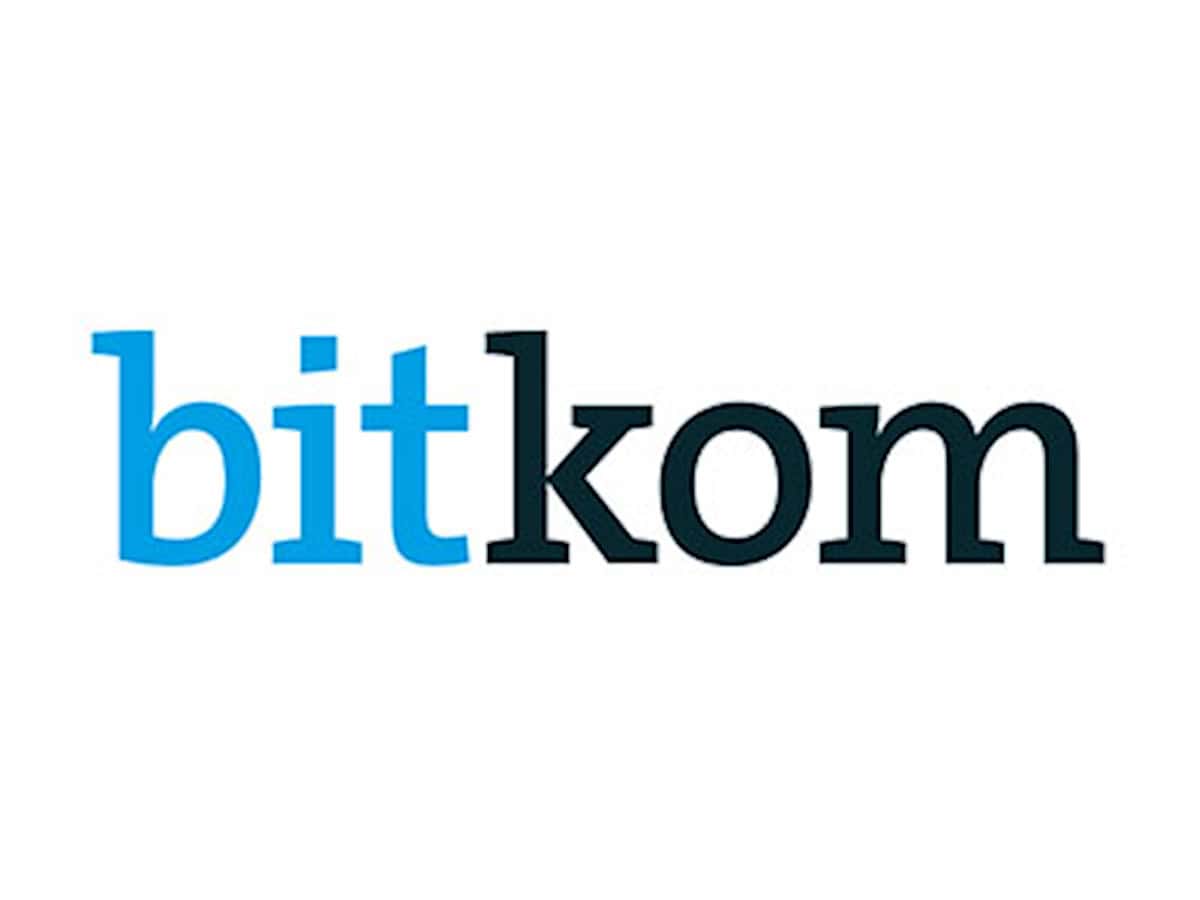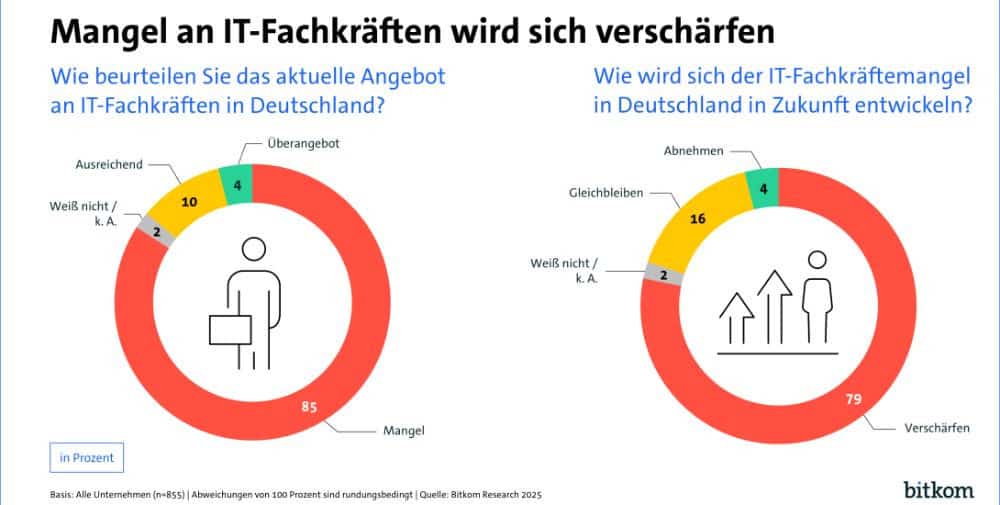
“The economic slowdown and geopolitical uncertainties have made companies reluctant to hire new staff or have even cut back on IT positions. At the same time, the digitalization of companies, but also in administrations and authorities, is progressing, so that more rather than fewer IT experts are needed there,” says Bitkom President Dr Ralf Wintergerst. “In view of the demographic trend in Germany, where far fewer young people are entering the labor market than older people are retiring, we must make more efforts to close the IT skills gap. The skills shortage must not become a brake on digitalization.”
However, 6 percent of companies have had to lay off IT specialists in the past twelve months due to the economic situation and 14 percent expect this to be the case in their company in the next twelve months. As many as 35 percent expect that the German economy will see job cuts in IT due to the weakening economy. However, 6 percent also say that they have already hired IT specialists who have lost their jobs elsewhere due to the economic situation. And 52 percent expect to have better chances of finding IT specialists in the future because jobs are being cut elsewhere.
AI will change IT professions, even replace them – and create new jobs
Every twelfth company (8 percent) is increasingly using artificial intelligence to counteract the shortage of IT specialists. It is not yet possible to say what impact AI will have on the IT labor market. Around one in four companies (27%) expect to cut jobs as a result of AI, and 16% expect AI to make jobs that cannot be filled anyway redundant. However, 42% assume that AI will create additional demand for IT specialists in the company. “AI can already perform a variety of tasks in IT today, from support requests to code creation. However, the need for AI specialists will also increase if more companies want to use artificial intelligence and integrate it into their systems,” says Wintergerst.
42% of companies expect AI to create new job profiles in IT, while 34% assume that AI will replace individual IT professions and job profiles. 35 percent assume that AI will increase productivity and 20 percent that the quality of work results will improve. And a quarter of companies (24 percent) expect that IT specialists without AI knowledge will no longer be in demand in the future.
3 out of 10 companies are not taking any measures to combat the IT skills shortage
In addition to AI, companies are primarily relying on training programs to qualify employees for new tasks (31 percent) in the fight against the IT skills shortage. 22% have special programs for career changers and 19% have programs to keep older employees in their jobs for longer. 14 percent have introduced support measures for women and 7 percent have diversity and inclusion programs. 12% are increasingly relying on external IT specialists – and 3 in 10 companies (29%) are currently doing nothing at all to combat the shortage of IT specialists. “Companies need to further increase their own efforts in recruiting IT specialists. There is still great potential, particularly in terms of further training, lateral entry and attracting women to IT professions,” says Wintergerst.
Hindrances to filling vacancies: money – but also a lack of flexibility
On average, it takes 7.7 months to fill a vacant IT position. That is just as long as it was two years ago. Mostly it’s about the money. 63 percent say that the applicants’ salary expectations do not match their qualifications, while 56 percent say that their salary expectations do not fit in with the company’s salary structure. Another frequent complaint is the unwillingness to relocate (44 percent). Conversely, however, companies also fail due to a lack of flexibility: 43 percent admit that they cannot meet job seekers’ requests for mobile working and 29 percent cannot meet the requirements for flexible working hours. “Even in a competitive labor market, companies cannot pay arbitrarily high salaries. All the more reason for them to review their work organization in order to be attractive to applicants who can choose their position,” says Wintergerst.
Further difficulties in filling IT jobs include a lack of soft skills among candidates (38 percent), a lack of German language skills (35 percent) or foreign language skills (28 percent). While 34 percent complain that applicants are under-qualified, 3 percent say that they are partially over-qualified. For 22 percent, very specific requirements regarding knowledge of the latest technologies are not met. At the same time, 14 percent admit that they are unable to offer the further training that candidates want, 7 percent make personnel decisions too slowly and 5 percent say that some applicants are too old. Moreover, one in four companies (25 percent) has a fundamental difficulty in filling IT positions: It receives virtually no applications.
For IT jobs, lateral entry is almost as important as university studies
IT jobs are not just reserved for academics: Only just over a quarter (27 percent) of those who have been hired in an IT job in the past twelve months have a relevant university degree, while a further 37 percent have completed a dual IT vocational training program, such as computer science. 10 percent have dropped out of an IT or IT-related degree course and started their career without a degree. The biggest detour into IT is taken by the many career changers. 27 percent of IT jobs went to this group. 36 percent of companies that hire career changers state that they typically have vocational training outside of IT, while 21 percent state that they have a non-IT university degree. 43 percent of companies state that career changers have practical IT experience, 26 percent cite further IT training such as a boot camp and 25 percent self-taught IT know-how.
US policy as an opportunity for the search for IT specialists abroad
Only 14 percent of companies have recruited IT specialists abroad to date: 5 percent continue to do so, 9 percent have done so in the past but have currently discontinued this practice. A quarter (24%) intend to look abroad for IT specialists in the future. For 60 percent, however, this was and is not an issue. In the opinion of German companies, the political developments in the USA could be an opportunity to attract more IT specialists to Germany. 45% believe that US President Donald Trump’s policies have made the USA less attractive to foreign IT specialists. 21 percent see an opportunity to bring IT specialists from the USA to Germany, while 27 percent believe that it is now easier to route IT specialists from non-EU countries to Germany instead of the USA.
Where policy should start: Working hours, immigration, active pension
With regard to the labor market in general, companies consider three announcements from the coalition agreement to be particularly promising: three quarters (74 percent) would be helped by a weekly maximum working time instead of a daily maximum, 69 percent by the promotion of skilled labor immigration and 67 percent by the active pension, which aims to keep older employees in the workforce for longer. Other measures follow a long way behind. A third (33%) would benefit from the standardization of certificates for further training and a mandatory pension scheme for newly self-employed people. A quarter (24%) would benefit from a federal law on collective bargaining. 17 percent would like to see a reform of the status determination procedure for the self-employed and 9 percent mention the obligation to record working hours electronically.
“Politicians should prioritize implementing those measures that bring concrete benefits to companies,” says Wintergerst. The switch from daily to weekly maximum working hours would allow employees to organize their working hours more flexibly. It would also promote a change of perspective, away from the model of the industrial workplace from the previous century and towards the agile working world of the future. When it comes to the immigration of skilled workers, Bitkom particularly advocates the creation of a “work-and-stay agency” with a central IT platform as a single point of contact for foreign skilled workers and the consistent digitalization and centralization of all processes. The active pension is also important. “The active pension is a real paradigm shift in German labor market and social policy. For the first time, we are seriously discussing how we can keep well-trained specialists in the workforce for longer – and not how we can get them out of the labor market as early as possible. For companies, this means an obligation to continuously train older employees and to offer them career prospects beyond the age of 66 or 67,” says Wintergerst.
– – – – – –
Further links
👉 www.bitkom.org
Graphic: Bitkom



